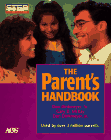

 R E V I E W Systematic Training for Effective Parenting The Parent's Handbook by Don Dinkmeyer and Gary D. McKay reviewed by Paula J. Hassler Click on book cover to see the book at Amazon.com This workbook reads like a latter day version of two books from the 1970s -- Dr. Thomas Gordon's PET ("Parent Effectiveness Training") and Dr. Rudolf Dreikurs ("A Parent Guide to Child Discipline"), both of whom are quoted in various sections of this book. The philosophy advanced here is that child rearing can be much easier on all parties if the parent uses encouragement and natural and logical consequences as a guiding principle in child rearing. For example, if Johnny forgets his school lunch, he could go hungry. (Obviously, this method does not apply if Johnny wants to play in traffic or experiment with explosives.) Good behaviors brings good results because if Johnny remembers his lunch he won't have to go hungry or try to convince mom to make an extra trip to school. The authors thoroughly explain how this more democratic method actually works. However, one danger is that beginners could misconstrue STEP as promoting permissiveness in child raising -- and that's not what this is about. The authors demonstrate that through this new method, parents learn how to engender mutual respect -- which results in the child's cooperation and eventual self reliance. Some of the parenting skills to be learned are how to send "I-messages" (stating true feelings in sentences beginning with the pronoun "I") instead of sending "you-messages" (which tend to place blame). Other skills include reflective listening (the parent repeats what he or she thinks the child is trying to express) and how to elicit cooperation from the child. Family meetings are also encouraged. On the other hand, the traditional method of Discipline is explained as a system of rewards and punishment that almost always degenerates into lecturing, nagging, anger, threats, warnings, punishment, shaming, removing privileges, and all those things that can discourage cooperation between family members. The book is well written and the exact steps to be learned are well explained. There are weekly work sheets where the parents can write out their specific concerns and their current progress. Most of the anecdotes and examples of mutual respect and cooperation between the two generations revolve around high-functioning two-parent families. Unfortunately, these skills could be extremely difficult to achieve in families that need them the most -- stressed out single-parent families, families with two career-and-social-life focused parents or those with alcohol or other drug related problems. Also many people might resist STEP philosophies because of the macho "Hey, I'm the boss and those kids better mind me or else!" syndrome. Fortunately, there are STEP support groups all over the USA and the places to contact are listed in the back of the book. I took Dr. Gordon's PET seminar in the late 1960s and from experience with my own children, now grown, I can say without reservation that the process works -- not only with children but with peers. I can also state that it is extremely difficult to unlearn the traditional concepts we were brought up with -- and to be able to react, especially in times of stress, in accordance with the new principles. However, if you can learn how to communicate this way, you will have many thousands of rewards for the rest of your life. 
|